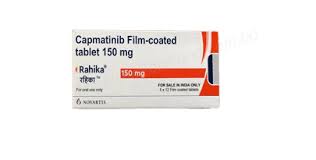Rahika 150mg is a prescription medication used to treat certain types of cancer, including non-small cell lung cancer (NSCLC). It is a MET inhibitor that works by inhibiting the growth of cancer cells and reducing the production of new blood vessels that feed the tumor.
Composition:
- Rahika 150mg: Capmatinib 150mg
Mechanism of Action:
Capmatinib, the active ingredient in Rahika, is a MET inhibitor that works by:
- Inhibiting the growth of cancer cells by blocking the action of specific enzymes that promote cell growth and division.
- Reducing the production of new blood vessels that feed the tumor, which helps to reduce its growth and spread.
- Inhibiting the activity of various signaling pathways that contribute to cancer cell growth and survival.
Indications:
Rahika is approved for the treatment of:
- Non-small cell lung cancer (NSCLC) in patients who have progressed after previous treatment and have tumors with a MET exon 14 skipping mutation.
Dosage:
The recommended dosage of Rahika is:
- 150mg orally twice daily, taken at the same time every day.
- The recommended duration of treatment is until disease progression or unacceptable toxicity.
Side Effects:
Common side effects of Rahika include:
- Nausea
- Fatigue
- Diarrhea
- Abdominal pain
- Headache
- Skin rash
- Hair loss
- Muscle pain
- Increased risk of bleeding or bruising
- Increased risk of liver enzyme elevation
Recommendation:
Rahika is recommended for patients who have been diagnosed with NSCLC and have a MET exon 14 skipping mutation and have not responded to other treatments or have disease that has progressed after surgery and radiation therapy.
Important Note:
- Patients taking Rahika should be closely monitored for signs of bleeding or bruising due to the risk of thrombocytopenia.
- Patients taking Rahika should avoid taking medications that may increase the risk of bleeding or bruising.
- Pregnant or breastfeeding women should not use Rahika, as it may harm the fetus or infant.
- Regular follow-up appointments with your healthcare provider are necessary to monitor the effectiveness of Rahika and to detect any potential side effects or complications.
Special Precautions:
- Patients with a history of kidney disease should be closely monitored for signs of worsening kidney function while taking Rahika.
- Patients taking Rahika should avoid taking medications that may interact with it, such as anticoagulants or medications that can increase blood pressure.
- Patients with a history of heart disease or high blood pressure should be closely monitored while taking Rahika.
Contraindications:
- Patients with severe liver disease or severe kidney disease should not use Rahika.
- Patients who are allergic to capmatinib or any other component of Rahika should not use it.
- Patients who are pregnant or breastfeeding should not use Rahika.




Reviews
There are no reviews yet.